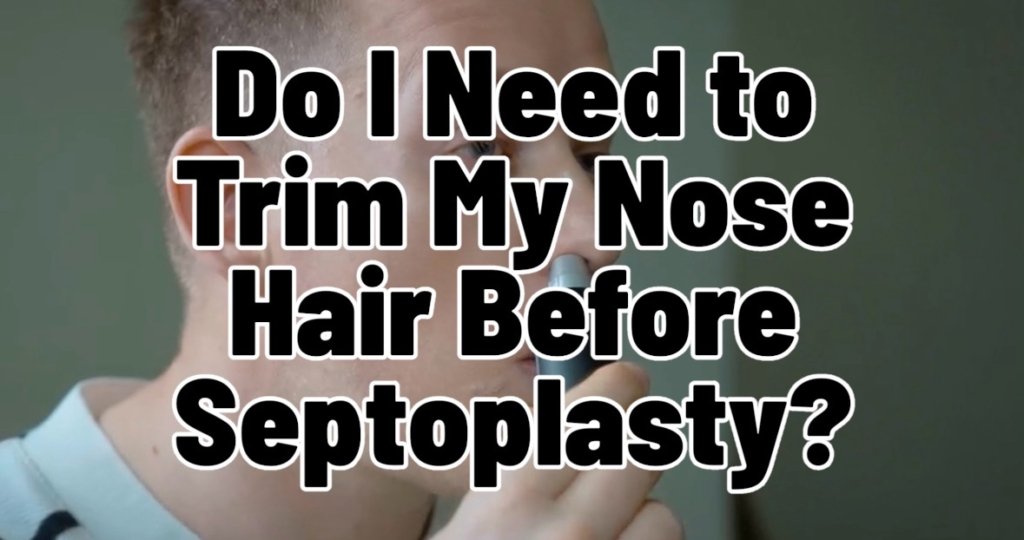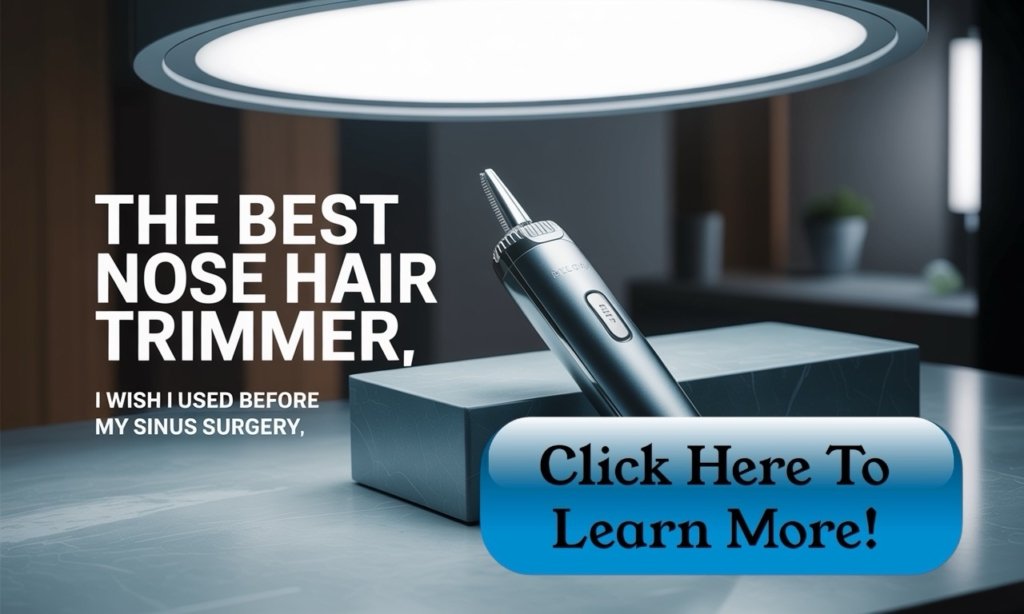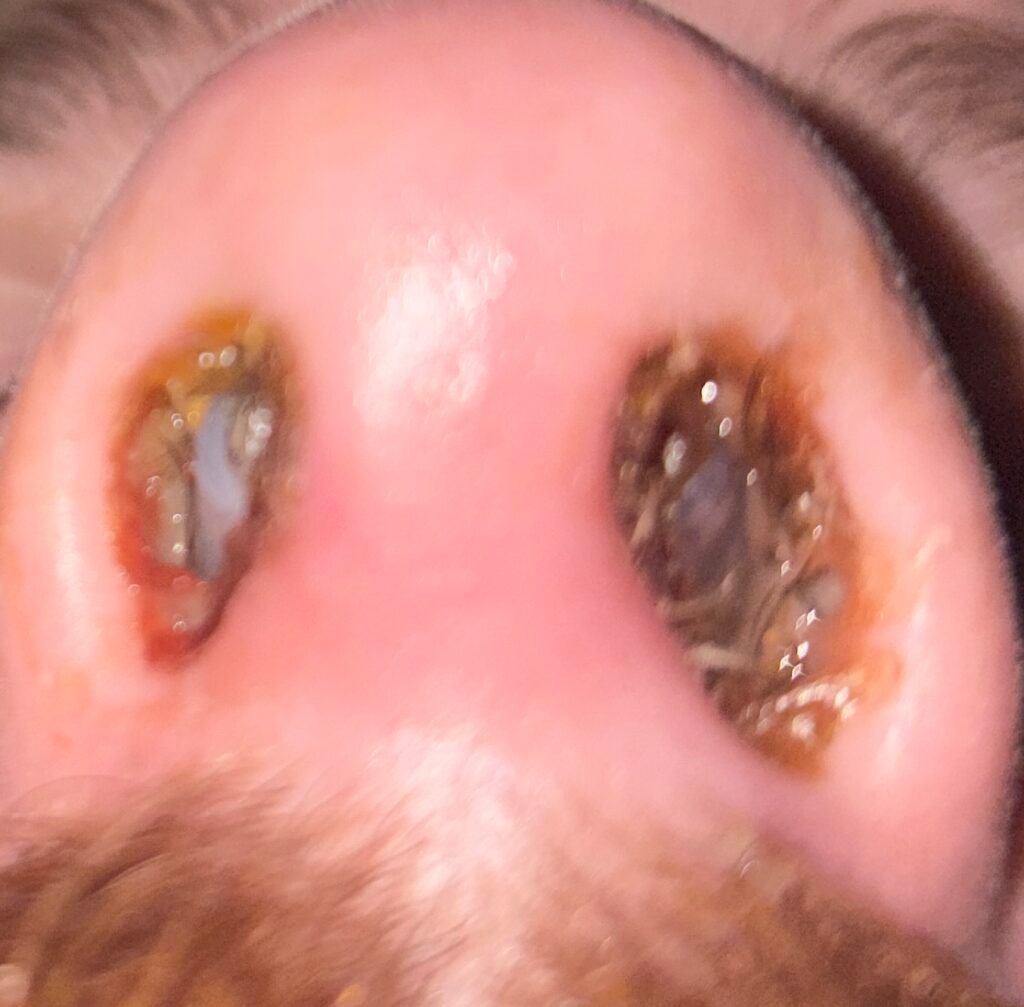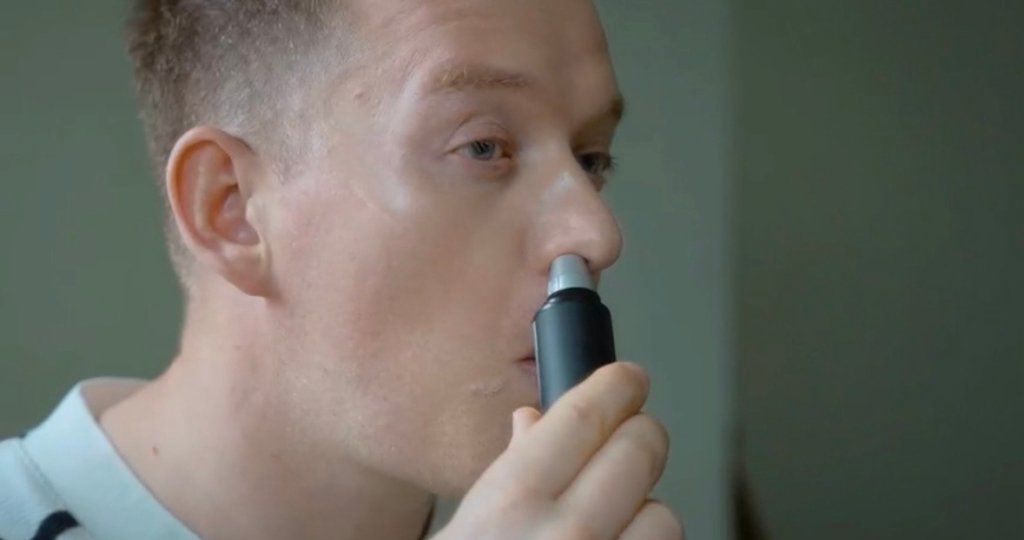
No One Talks About Nose Hair Before Sinus Surgery — But They Should
Let me just say it: I wish someone had told me to trim my nose hair before my sinus surgery. It sounds like such a small thing, but wow — it would’ve saved me a ton of discomfort during recovery.
In the days following surgery, I expected some bleeding, congestion, and pressure. What I didn’t expect was that dried blood, mucus, and even saline rinse would get stuck and tangled in my nose hairs, turning every cleaning session into a frustrating, painful mess.
If you’re reading this and wondering do I need to trim my nose hair before sinus surgery? — you’re in the right place. Trust me, this is one step you won’t want to skip.
👉 Want to see my full recovery breakdown? I tracked everything here:
My Day-by-Day Sinus Surgery Recovery
What Happened When I Didn’t Trim My Nose Hair
After the surgery, everything felt super sensitive — which is expected. But what really caught me off guard was how much dried blood and crusty buildup kept clinging to my nose hairs. I couldn’t blow my nose, I couldn’t rinse comfortably, and even just breathing through my nose felt… wrong.
Every time I used a saline rinse or applied ointment, it was like trying to clean out a spiderweb. The more I tried to dislodge stuff, the more irritated my nose felt. I’d wipe away dried blood, only for more to build up in the exact same tangled hairs again.
Honestly, I sat there thinking, Why didn’t anyone mention this? I even had a nose hair trimmer sitting in my drawer at home.

Why Doctors Don’t Always Mention This Step
ENTs do an amazing job handling the medical side of things, but when it comes to personal prep like nose grooming, they usually don’t bring it up unless absolutely necessary. They’re focused on your septum, not your stubble.
Some might trim internal nose hair themselves if it blocks access, but most won’t bother unless it’s extreme. That means it’s up to you to handle the “simple” stuff — and yet, no one hands you a checklist for this before surgery.
It’s such an overlooked part of the prep, but trimming your nose hairs can seriously cut down on irritation, dried blood buildup, and scabbing that drags out recovery.
Can You Trim Nose Hair Safely Before Septoplasty?
Yes — and it’s safe, easy, and totally worth it. You just need to make sure you’re doing it right.
Never pluck or wax before nasal surgery. That can leave the hair follicles open to infection, and you don’t want any unnecessary irritation inside your nose right before you go under. Instead, use a gentle nose hair trimmer that snips the hair neatly without touching the skin.
Here’s the one I wish I’d used ahead of my surgery — and now keep on hand for regular touch-ups:
👉 Ear and Nose Hair Trimmer Clipper – 2025 Waterproof, Painless, Easy to Use
Quick Tip:
Trim 2 to 3 days before surgery, not the night before. That gives your skin a little time to recover from any minor irritation just in case.

When Should You Trim Nose Hair Before Surgery?
Timing matters. If you trim too close to surgery, you risk irritation. If you wait too long, you’ll be dealing with nose hair jungle conditions while your nose is healing — and trust me, that’s not fun.
The sweet spot is 2–3 days before your procedure. This gives your nasal passages time to settle, ensures the hairs are out of the way during surgery, and sets you up for an easier cleaning and recovery process afterward.
I didn’t trim mine at all — and immediately regretted it. The saline rinses just matted everything up. If I could go back, I’d schedule a quick nose grooming session 48 hours pre-op. Learn from my mistake.
The Nose Hair Trimmer I Recommend Now (Wish I’d Used Sooner)
Let me introduce you to the tool I now keep permanently in my bathroom drawer:
👉 Ear and Nose Hair Trimmer Clipper – 2025 Waterproof, Painless, Easy to Use
This little device is:
- Battery-operated and cordless, so you can use it anywhere.
- Waterproof (IPX7), meaning easy to rinse and clean.
- Gentle and painless, thanks to its dual-edge blades.
- Designed to handle ear, nose, eyebrow, and facial hair with no tugging.
If I’d used this a couple days before surgery, I would’ve avoided so much irritation. Plus, it’s just good to have on hand for ongoing maintenance — especially after sinus surgery when your nose will be under close observation.
👉 Get it here on Amazon and be prepared: https://amzn.to/4nrauH7

Will My Doctor Trim My Nose Hair Before Septoplasty?
Most likely… no.
ENTs focus on the surgical process, and unless your nose hairs are actively in the way, they won’t take the time to trim them. And even if they do a small trim for access, it won’t be enough to prevent post-op issues like I experienced.
That’s why this part of prep is really on you.
If you’re prepping for sinus surgery and wondering what else you’ll need, check out my full guide with real products and advice:
👉 My Sinus Surgery Must-Haves (What Helped Me Heal)
Can Long Nose Hair Cause More Scabbing and Crusting?
Yes — and this is exactly what happened to me.
When you have long or thick nose hair, it acts like a trap for everything — blood, mucus, ointment, saline, even scabs. Instead of clearing out, this stuff clings to the hair and builds up into an itchy, crusty nightmare.
Even my doctor said everything looked fine inside, but I still felt like my nose was always full of junk. Turns out, it wasn’t swelling — it was debris clinging to hair I could have easily trimmed beforehand.
This is where that 2025 Nose Hair Trimmer would have saved the day. It’s such a simple tool, but it can make a major difference in your comfort level during recovery.

What Happens If You Don’t Trim Your Nose Hair Before Surgery?
Speaking from personal experience… it gets messy.
After sinus surgery, your nose becomes a collection zone for everything — dried blood, saline spray residue, crusted scabs, and post-op ointments. If your nose hairs are long, all that junk sticks to the hair and makes it 10x harder to breathe or clean your nose.
I found myself constantly rinsing with saline, blowing gently, trying to dislodge stuff — only to realize it was tangled in the hair and wouldn’t budge. It was frustrating and uncomfortable for weeks.
So yeah… skipping the trim can slow down your healing, lead to irritation, and make you feel like you’re never fully clear.
Is Nose Hair Trimming Safe Before Septoplasty?
Absolutely, as long as you use the right tool and don’t go overboard.
Avoid scissors or tweezers (those can cause nicks or infections) and instead use a safe, painless nose hair trimmer like this one I now swear by:
👉 Ear and Nose Hair Trimmer Clipper – Painless and Waterproof
It’s designed to trim hair without touching skin, and it won’t cause any irritation or trauma to your nasal lining — something that’s critical when prepping for surgery.
I recommend trimming 2–3 days before surgery to give your nasal tissues a little buffer before they undergo the real procedure.
Can I Use the Nose Hair Trimmer After Surgery Too?
Yes — but wait until your ENT gives you the green light.
Usually, you’ll need to let your nose fully heal for a few weeks before using any trimmers. But once your doctor says it’s safe, a tool like this will become your best friend. Clean, short nasal hair = less buildup and easier breathing.
It’s one of those small investments that pays off long after surgery ends.
Need to see what I used and what I should have used earlier? I put it all in one place here:
👉 The Best Nose Hair Trimmer I Wish I Used Before My Sinus Surgery

What Else Should I Do to Prepare for Sinus Surgery?
Beyond nose hair trimming, there are several things that helped me prep for my surgery and recovery:
- Start saline rinses early – to get used to the process. Check out this very affordable, yet amazing nasal irrigation tool!
- Invest in a good humidifier – to keep things moist post-op. (Here’s the best humidifier after septoplasty I used!)
- Avoid antihistamines right before surgery – they can dry you out.
- Meal prep soft foods – because chewing will hurt for a bit.
- Set up a comfy recovery space with tissues, a trash can, and tons of water.
The more you prep before the surgery, the smoother your recovery will feel. And yes — trim your nose hair. It’s a small thing that makes a big difference.
As an Amazon Associate we earn from qualifying purchases through some links in our articles.


